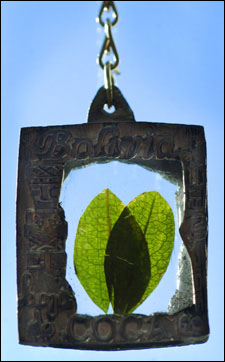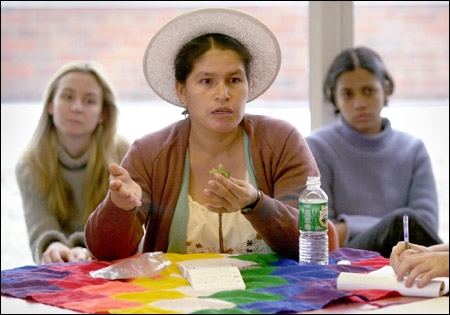Bolivian peasants suffer in drug war, speaker says:
Coca plant’s traditional uses make indigenous peasants targets

What America bills as a “War on Drugs” at home is executed as a war on peasants in the Bolivian Andes, the leader of a peasant coalition told a Kennedy School of Government audience on Friday (Feb. 28).
“Defending coca for [us] is defending [our] land, it’s the same struggle. It’s defending our culture, our health,” said Leonida Zurita Vargas, leader of the National Federation of Women Peasants in Bolivia. “We are fighting against the eradication of our culture.”
Zurita, speaking Spanish with an English translator, addressed about 40 people crowded into the Center for International Development’s Perkins Room during a lunchtime talk that lasted more than an hour.
Zurita, who took part in the Bridge-Builders Conference at Harvard earlier in February, described the experience of Bolivia’s indigenous peasants for whom coca is a traditional plant. Those peasants are caught in the crosshairs of the U.S. and Bolivian governments’ war against the trade in cocaine, which is made from coca leaves.
In addition to its use for illegal drugs, however, Zurita said the plant is commonly grown in peasant kitchen gardens and its leaves are used to make tea, cakes, and natural medicines, and are used in ritual fortune-telling. Coca leaves are also used as part of the local economy, and can be traded to buy potatoes and other staples, she said.

The government’s opposition to peasant coca cultivation has had various impacts, she said. In the late 1980s, the government instituted a voluntary program where peasants were compensated for reducing their coca production and planting other crops. The government paid peasant families between $300 and $2,500 to help them purchase bananas, pineapples, and other plants, but prices subsequently fell dramatically to the point where a peasant would have to sell 60 pineapples to earn just one dollar.
“The whole alternative development program has been a complete failure,” Zurita said.
The low prices for other crops prompted many peasants to return to planting coca, Zurita said. The Bolivian government raised the stakes in 1998 with a coca eradication plan, which has effectively militarized Zurita’ native Chapare region. The search for coca and drug traffickers has resulted in the military investigating schools and teachers and searching private homes. If families have a mountain bike or other expensive items, Zurita said, they are assumed to be involved in the drug trade and their homes are burned down.
Across the region, she said, there have been rapes and other human rights violations. The peasants, meanwhile, don’t know their rights. For example, she said, it wasn’t until she joined the union that she learned that the police had to ask permission to enter a home and search.
The result has been violent blockades by peasants at which both peasants and police have died.
Last fall, the peasant unions began negotiating with the government for a stop in the eradication program if they increase the planting of other crops. They’re also looking for a study of the legal uses of the coca leaf so the plant can continue to play a role in the local economy.
Part of the problem, however, is U.S. government pressure on the Bolivian government to continue the war on drugs. That’s why Zurita brought her story to the United States. She urged people in the audience to spread the word that the coca plant is not the same as cocaine. She said she needs help to “de-Satanize” the coca plant. Trying to eliminate coca is to Bolivian peasants, said Zurita, as trying to ban the grape would be to wine-drinkers in the United States.
She also asked for help in stopping alternative development projects, which, she said, are not only a failure in the field, but also see much of their funds siphoned off into the pockets of unscrupulous government officials.




